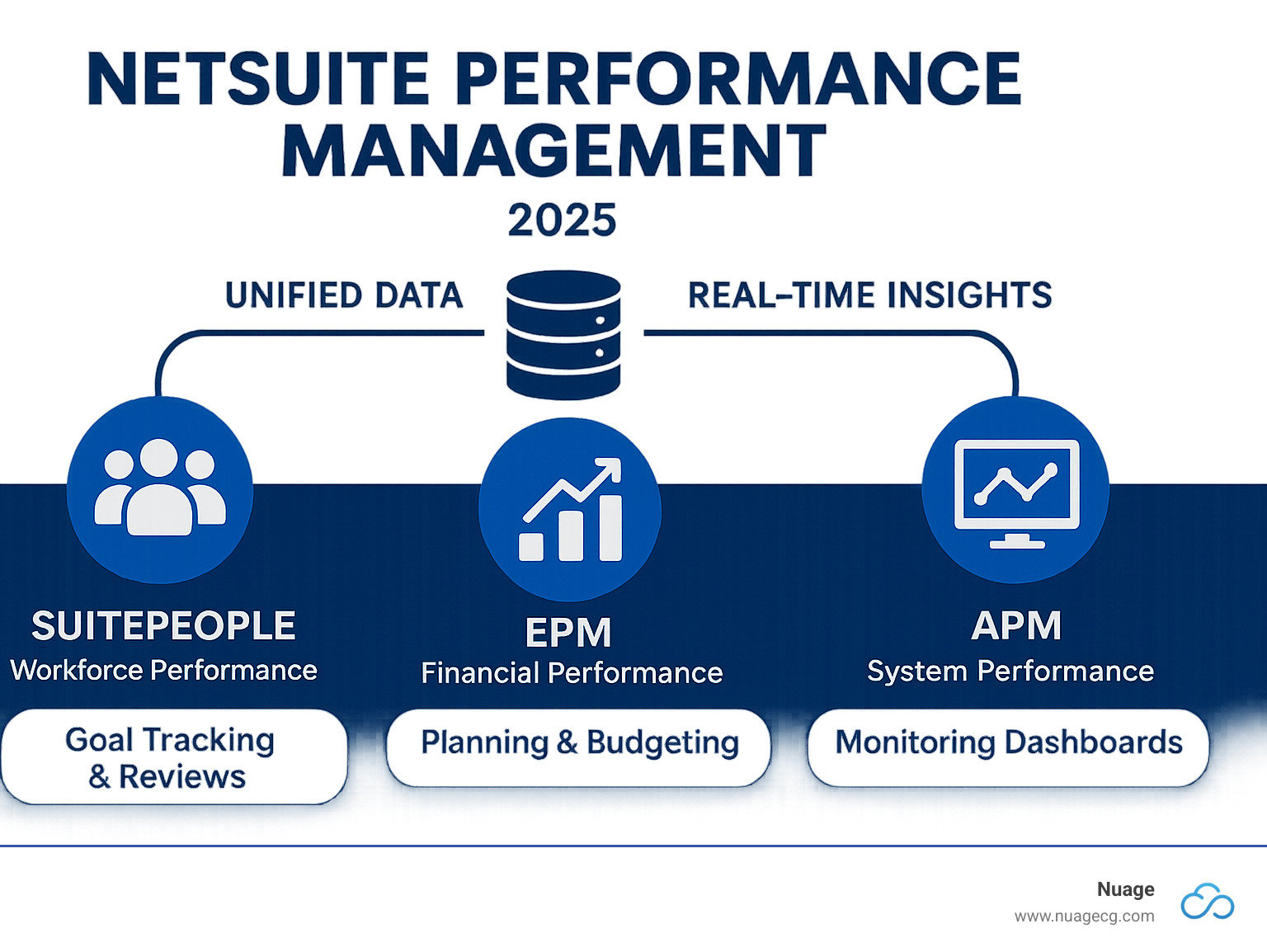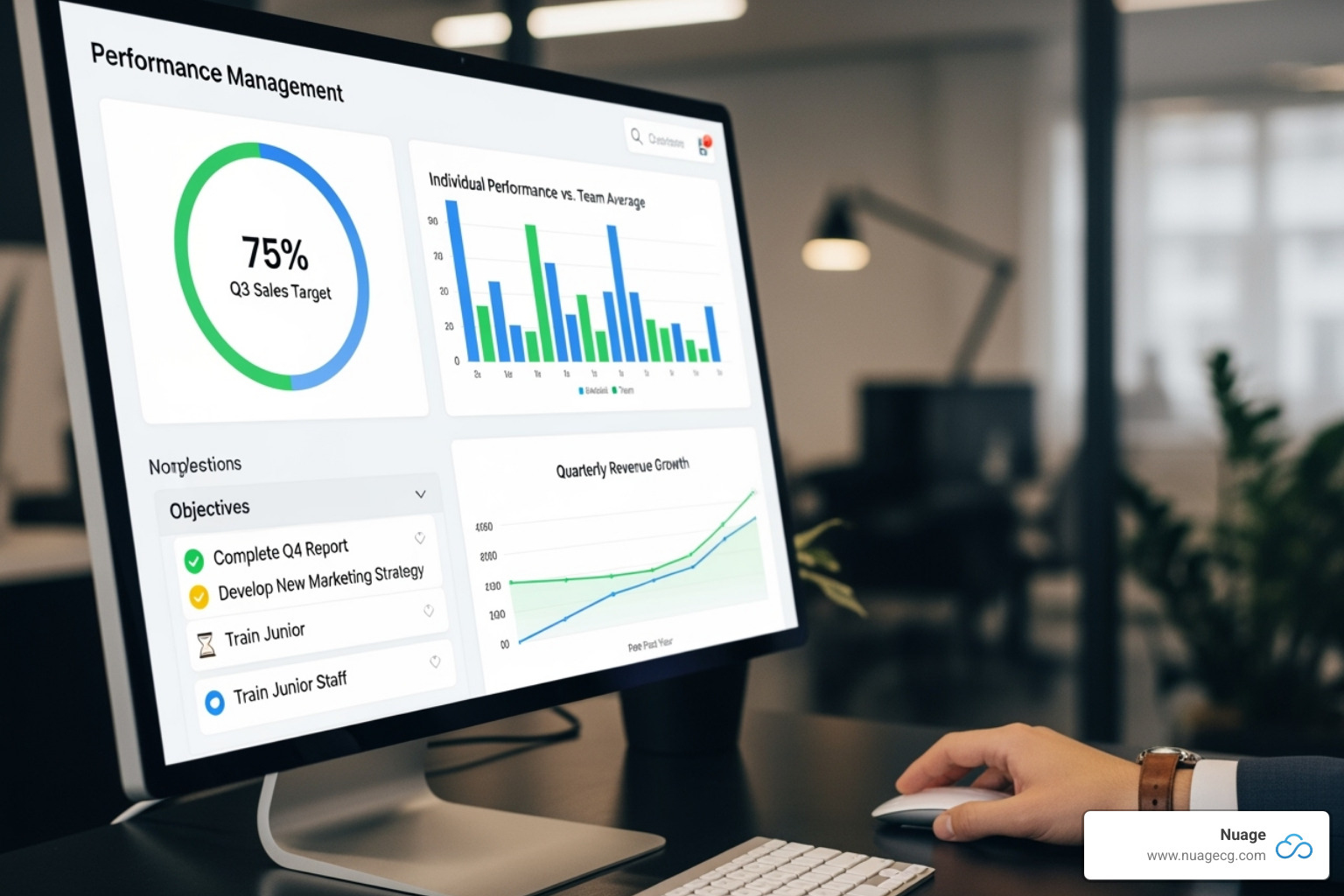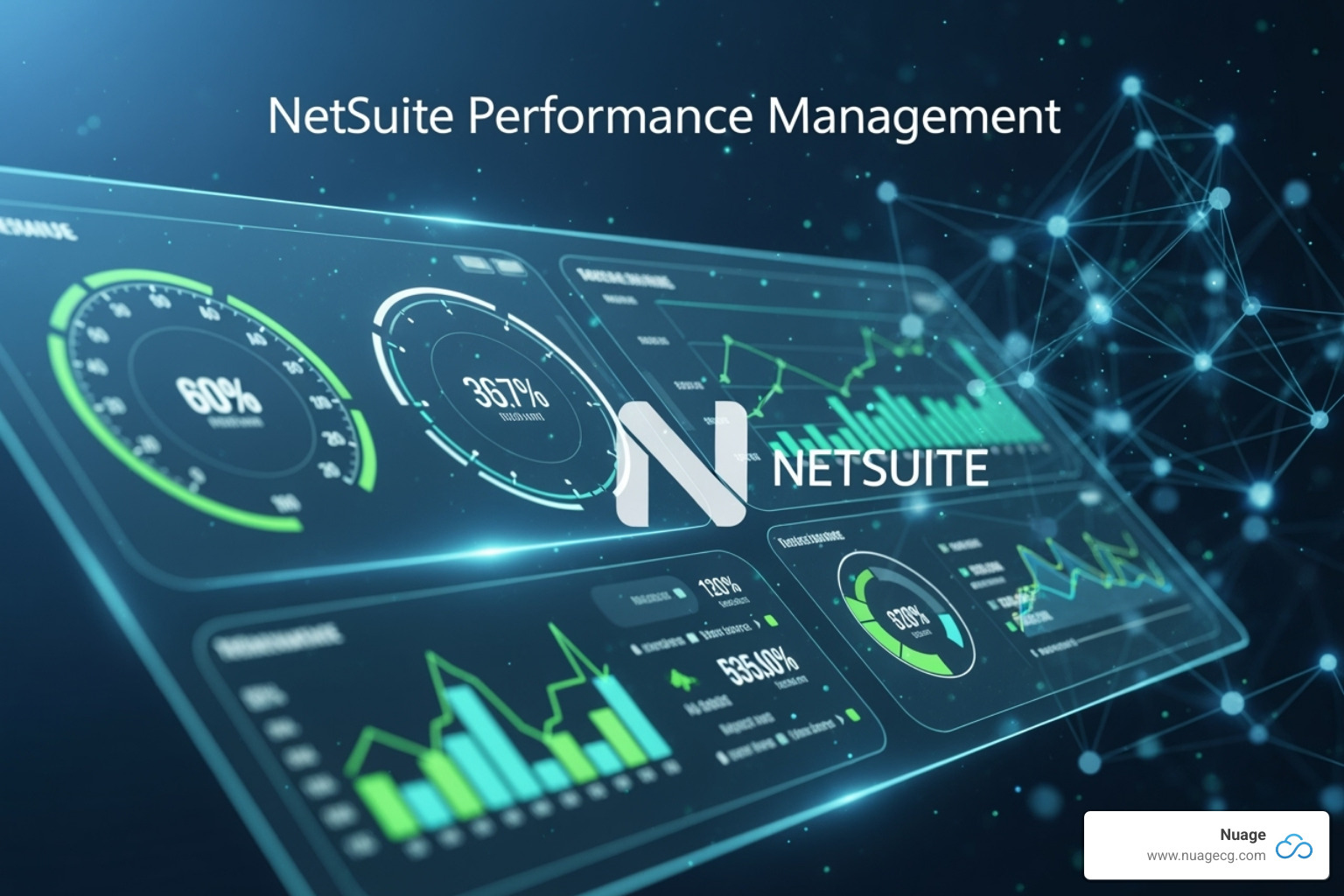Why NetSuite Performance Management Goes Beyond Traditional Reviews
NetSuite performance management is a comprehensive system that optimizes three critical areas of your business: people, processes, and technology. Unlike traditional reviews focused on employee evaluations, NetSuite’s approach integrates workforce management, financial planning, and system optimization into one unified platform.
The Three Pillars of NetSuite Performance Management:
- SuitePeople Performance Management – Employee goal setting, performance reviews, and career development
- Enterprise Performance Management (EPM) – Financial planning, budgeting, forecasting, and strategic decision-making
- Application Performance Management (APM) – System monitoring, customization optimization, and technical performance tracking
This integrated approach connects your HR data to financial planning, while system performance insights inform better operational decisions. Instead of managing these areas in silos, NetSuite creates a single source of truth for data-driven decisions across your organization.
Companies using NetSuite’s full performance management capabilities report faster financial closes, higher employee engagement, and improved system efficiency. Yet most businesses only scratch the surface of what’s possible. With over 20 years of experience helping companies optimize their NetSuite systems, I’ve seen how the right performance management strategy can transform business operations from reactive to proactive.

Empowering Your Workforce: SuitePeople Performance Management
Your people are the heart of your business. SuitePeople Performance Management moves beyond the dreaded annual review, creating a dynamic system where your team can grow, get recognized, and develop their careers. It transforms goal setting, performance assessment, and career development into a natural, supportive process woven into the daily fabric of your workplace, ensuring managers and employees stay aligned.
Core Features for Employee Growth and Assessment
The magic happens when you see how SuitePeople’s tools work together to create genuine opportunities for growth. These features transform performance management from a chore into something that actually helps people succeed.

Goal collaboration becomes effortless as employees and managers set meaningful objectives together. For example, sales targets can automatically update based on real CRM data, so everyone knows exactly where they stand.
Progress tracking happens in real-time through personalized dashboard portlets. Team members can see their progress at a glance, and managers can spot who might need support before problems develop.
Real-time feedback flows naturally through threaded conversations year-round. This ongoing dialogue makes formal reviews less stressful and more productive.
Customizable review templates adapt to your organization’s unique needs for different departments or job types. The system automatically pulls individual goals into reviews, so managers spend less time gathering information and more time on meaningful conversations.
Employee recognition gets a boost through the Kudos feature, which lets team members celebrate each other’s wins, building a culture of appreciation.
You can explore these capabilities on the SuitePeople Performance Management System page. For a broader look, our guide on NetSuite HR Modules provides the complete picture.
Integrating HR Performance with Business Operations
NetSuite performance management connects your people strategy directly to business results, creating meaningful links between individual performance and company success.
Data-driven goals pull information from your NetSuite CRM Modules and PSA integration, so employee objectives reflect real business metrics. A customer success goal can connect directly to actual customer data, not just wishful thinking.
Automated progress updates eliminate guesswork. Project managers can see how team efficiency goals align with actual project data from PSA, while sales professionals track progress against real pipeline metrics.
The power of Suite Analytics brings everything together in comprehensive performance reporting. HR managers can spot trends, identify top performers, and see where support is needed, helping you make smarter decisions about your workforce strategy.
This integration transforms HR from a support function into a strategic partner that drives business results based on complete, unified information.
Aligning Strategy and Finance: NetSuite Enterprise Performance Management (EPM)
While your people drive your business, your financial strategy keeps it on track. NetSuite Enterprise Performance Management (EPM) is a complete approach combining processes and technology to show how your company performs against forecasts and goals. It unifies financial planning, budgeting, and forecasting to speed up processes, improve accuracy, and provide insights for better decisions.
EPM adoption is growing, with the worldwide market hitting $6.3 billion in 2022 and continuing to climb.
Want to see EPM in action? This video breaks it down: What is NetSuite Enterprise Performance Management? (Video). For a deeper dive, check out our guide on NetSuite Planning and Budgeting.
Key Components of NetSuite EPM
NetSuite EPM, built on Oracle Fusion Cloud EPM, eliminates tedious manual data gathering and spreadsheet overload with streamlined processes.
Planning and Budgeting transforms budget sessions into efficient, collaborative processes. You can quickly produce budgets and forecasts, model scenarios, and generate reports. Unifying financial and operational planning creates a single view of your business.
Account Reconciliation automates complex tasks, reducing errors and improving data accuracy.
Close Management and Consolidation standardizes your entire close process with automated tasks and workflows, delivering faster, more accurate financial closes.
Corporate Tax Reporting aligns tax processes with financial reporting for better visibility and compliance. Narrative Reporting lets you combine financial statements with text in single reports for smoother collaboration.
Profitability and Cost Management Reporting reveals profitability by customer, product, and business segment to drive smarter decisions.
Explore these capabilities further in our NetSuite Financial Planning resource.
The Strategic Advantage of a Unified EPM Solution
EPM creates a strategic advantage by unifying your financial and operational data, eliminating scattered spreadsheets and data silos.
The benefits transform how your business operates:
Improved Decision Making results from seamlessly integrated financial and operational data. Better accuracy and accessibility, backed by insights from NetSuite Data Analytics, lead to more informed decisions.
Automated Financial Close eliminates manual work, reduces errors, and speeds up processes that used to take days.
Data Consolidation and Accuracy are achieved through an integrated cloud platform that streamlines information collection and reduces manual entry errors.
The Comprehensive Solution approach means all financial processes work together on one platform for strategic decisions based on complete, accurate information.
This integration lets you model scenarios, identify trends to improve forecasts, and increase visibility with real-time dashboards, moving you from reactive reporting to proactive strategic planning.
Optimizing Your System: Application Performance Management (APM)
Think of your NetSuite system like a high-performance engine. You need to monitor it to keep it running smoothly. NetSuite’s Application Performance Management (APM) SuiteApp is your dashboard for system health.
The APM SuiteApp is your NetSuite performance management tool for monitoring how customizations perform, tracking system bottlenecks, and spotting issues before they impact productivity. This proactive approach lets you optimize your NetSuite customizations at any stage, keeping users happy and your business running smoothly. For comprehensive strategies, see our guides on how to Improve NetSuite Performance and NetSuite Software Optimization.
Diagnosing and Solving Common NetSuite Performance Management Challenges
Performance hiccups often stem from heavy customizations, complex integrations, or growing data volumes. APM turns detective work into data-driven diagnosis.

When record loads are slow, APM helps you break down page load times to find the cause, which is often heavily customized forms or inefficient saved searches.
Script errors and timeouts are easier to track with APM’s SuiteScript Analysis tool. It identifies resource-hogging scripts and workflows that are timing out, often leading to simple fixes like consolidating script entry points or adjusting when workflows trigger.
Long-running searches are exposed by APM’s Search Performance Analysis, allowing you to optimize their criteria or timing. Concurrency issues from integrations become visible by monitoring REST and SOAP web services, helping you understand their impact on performance.
APM’s granular approach transforms vague complaints into actionable optimization opportunities. For businesses with extensive customizations, our NetSuite ERP Customization expertise can help.
Essential Tools within the APM SuiteApp
The APM SuiteApp is a complete performance monitoring toolkit that provides comprehensive visibility into your system’s health.
The Performance Health Dashboard is your starting point, offering an instant snapshot of your account’s health and helping you prioritize issues.
The Record Pages Monitor provides detailed performance metrics for individual record pages, showing you exactly which pages are loading slowly and why.
The SuiteScript Analysis tool pinpoints inefficient code and identifies scripts that are timing out, helping you optimize your custom functionality.
The Concurrency Monitor tracks your system’s ability to handle multiple processes simultaneously, which is crucial for businesses with heavy integration loads.
Finally, the SOAP Web Services Analysis and REST Web Services Analysis tools provide detailed insights into your integration performance, crucial for troubleshooting data sync issues.
Together, these tools transform system monitoring from reactive firefighting to proactive optimization. Our NetSuite Integration Services can help you build robust, high-performing connections.
Best Practices for Holistic NetSuite Performance Management
Getting the most out of NetSuite performance management requires a strategic approach that brings together your people, processes, and technology. Success relies on solid implementation strategies, strong data governance, thoughtful customization, and continuous improvement. Most importantly, it means recognizing when you need expert guidance.
Our NetSuite ERP Implementation guide covers the foundations, but let’s dive into creating a strategy that works.
Implementing Your NetSuite Performance Management Strategy
Rolling out NetSuite performance management successfully requires careful planning.
Start with clear KPIs and goals. Before touching any settings, define what “performance” means for your organization. Align what you measure with what you’re trying to achieve.
Get your departments talking. Aligning goals across departments is critical. For example, HR’s retention goals should support finance’s cost-reduction objectives. We facilitate these conversations to ensure success.
Take it one step at a time. Start with core functionalities and gradually add advanced features. This phased approach gives your team time to adapt and prevents disruption.
Invest in training. A system is only as good as its users. Ensure everyone, from employees using SuitePeople to IT administrators monitoring APM, is confident with the tools.
Don’t go it alone. A NetSuite Implementation Consultant can save you months of trial and error. Our team brings over 20 years of experience to help you steer complexities and tailor solutions.
Maintaining Peak Performance Post-Implementation
Maintaining peak performance requires regular maintenance to prevent issues and keep things running smoothly.

Schedule regular performance check-ups. Use the APM SuiteApp for periodic audits to catch emerging bottlenecks before they become major problems.
Keep your customizations lean. Regularly review and consolidate custom scripts and workflows to ensure they remain efficient as your business evolves.
Clean house regularly. Remove unnecessary custom fields, streamline forms for specific roles, and enable features like “Delay Loading of Sublists” to improve load times.
Stay current with SuiteSuccess methodology. Continuously leverage NetSuite’s industry-specific leading practices to refine processes and configurations.
Monitor proactively. Set up APM dashboard alerts to be notified of performance deviations, allowing you to address issues before they impact productivity.
Maintain clean, strategic data. Efficient NetSuite Data Migration and ongoing data governance are essential for system performance and accurate EPM insights.
Frequently Asked Questions about NetSuite Performance Management
Here are answers to the most common questions we receive about NetSuite performance management, based on our experience in the field.
What’s the difference between SuitePeople Performance Management and NetSuite EPM?
While both have “performance management” in their names, they serve very different business purposes.
SuitePeople Performance Management is all about your people. It’s your HR command center for employees to set goals, track progress, receive feedback, and plan career development. It’s designed to boost employee engagement and align individual efforts with company objectives.
NetSuite Enterprise Performance Management (EPM) focuses on your financial and operational strategy. This is where your finance team plans budgets, forecasts revenue, analyzes profitability, and ensures a timely financial close. EPM turns business-wide data into actionable financial insights.
The systems work together seamlessly. When a sales team hits its goals in SuitePeople, that data flows into EPM to help create more accurate revenue forecasts. This integration is what makes NetSuite performance management so powerful.
How can I identify the cause of slow performance in my NetSuite account?
The Application Performance Management (APM) SuiteApp is your primary tool for diagnosis. Start with the Performance Health Dashboard for a quick system health check.
For slow page loads, use the Record Pages Monitor. This tool breaks down where the delay is happening (client, server, or network) and can pinpoint culprits like an inefficient custom field.
If you have custom scripts, the SuiteScript Analysis tool is invaluable. It can identify a script that is timing out and help you optimize it—for example, by changing it to run when a record is saved instead of when it’s viewed.
Finally, the Search Performance Analysis can identify resource-hungry saved searches. Optimizing these or moving them to run during off-peak hours can make a significant difference.
Does NetSuite Performance Management integrate with other business data?
Yes, deep integration is a core strength of NetSuite. Unlike standalone systems that create data silos, NetSuite is designed to connect everything.
SuitePeople Performance Management can pull data directly from your CRM or PSA modules. A sales rep’s goal to increase customer satisfaction can be linked to real CRM data like survey scores or renewal rates. A project manager’s performance metrics can update in real-time based on project completion data.
The EPM integration is even deeper. Every transaction in your system—sales, purchases, adjustments—becomes part of your financial performance picture. Operational efficiency gains and marketing campaign results flow directly into your profitability analysis and revenue forecasts.
Even the APM system monitors integrations with external systems, alerting you if they are slowing down your NetSuite experience.
This level of integration creates a single source of truth that drives better decisions across your entire organization, changing NetSuite into a strategic business advantage.
Conclusion
We’ve journeyed through NetSuite performance management, revealing it’s a strategic philosophy that transforms how businesses operate. This comprehensive approach, built on three interconnected pillars—people, finance, and systems—creates a foundation for sustained success.
- SuitePeople Performance Management aligns your employees with intelligent goal tracking and continuous feedback.
- NetSuite Enterprise Performance Management (EPM) provides the strategic financial and operational direction.
- Application Performance Management (APM) ensures your system runs smoothly without technical hiccups.
When these three elements work in sync, your HR data informs financial planning, and system insights improve operations. This creates a unified, data-driven view that moves your organization from reactive to proactive. The result is faster decisions, improved efficiency, and sustainable growth, driven by complete information.
As your NetSuite Optimization Engine, we at Nuage understand that implementing these capabilities is about more than technology—it’s about changing how your business operates. With 20 years of expertise in digital change, we partner with you to create solutions that fit your unique needs.
Whether you’re just starting your NetSuite journey or looking to optimize an existing implementation, we’re here to help you harness the full potential of these powerful tools.
Ready to see what NetSuite performance management can do for your organization? Let’s explore how we can help you fine-tune your operations and achieve your strategic objectives.
Optimize your NetSuite instance
